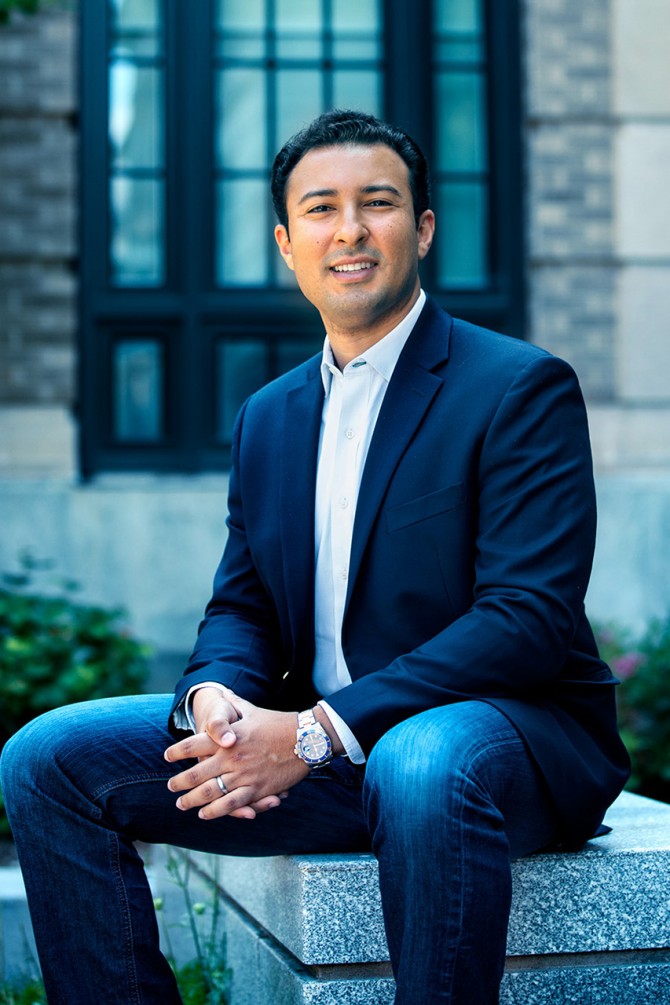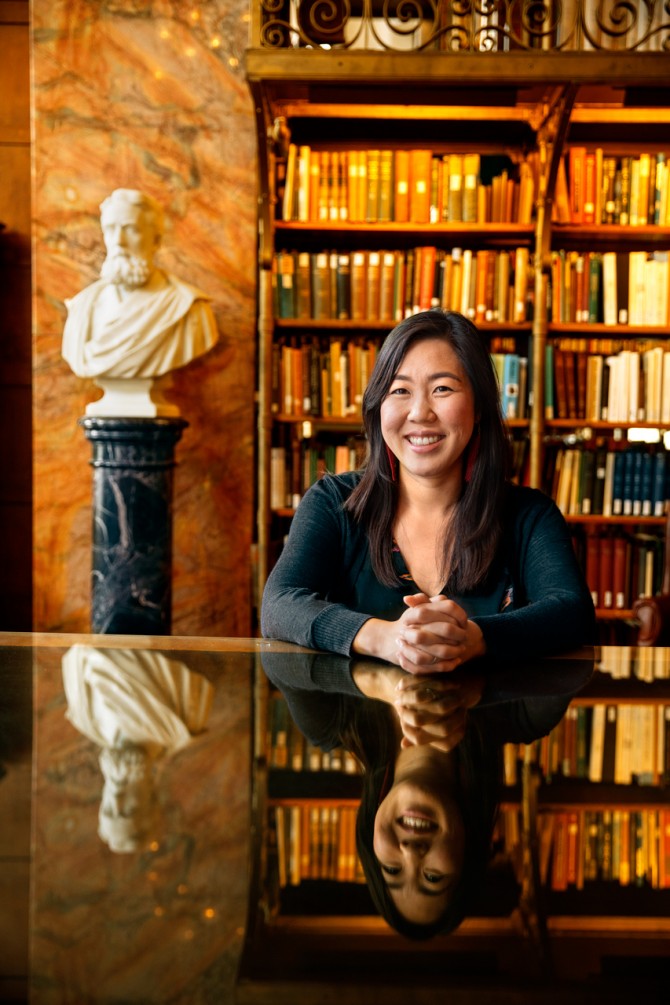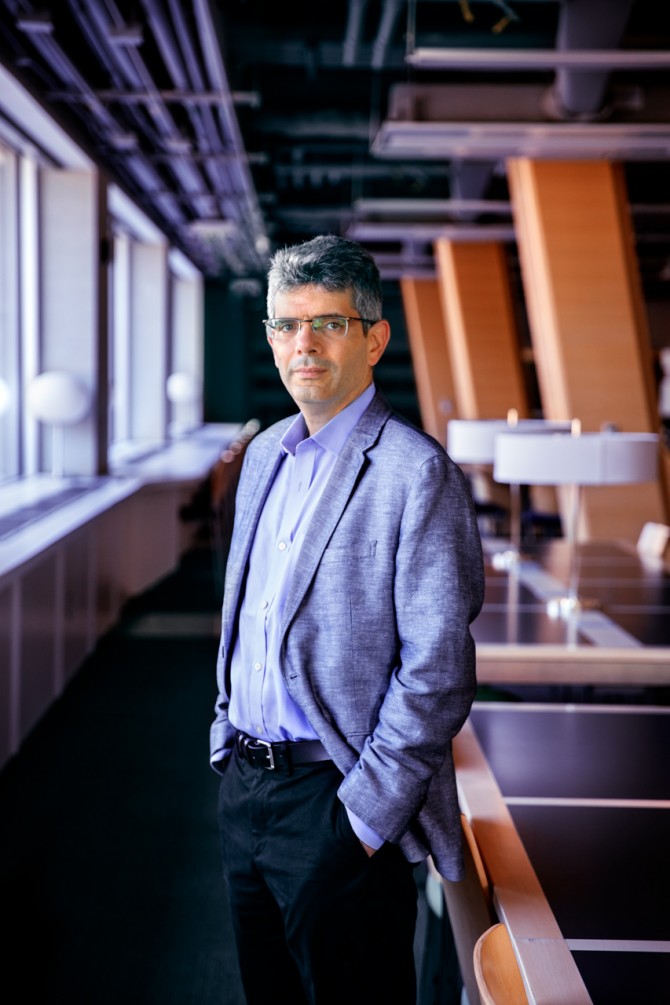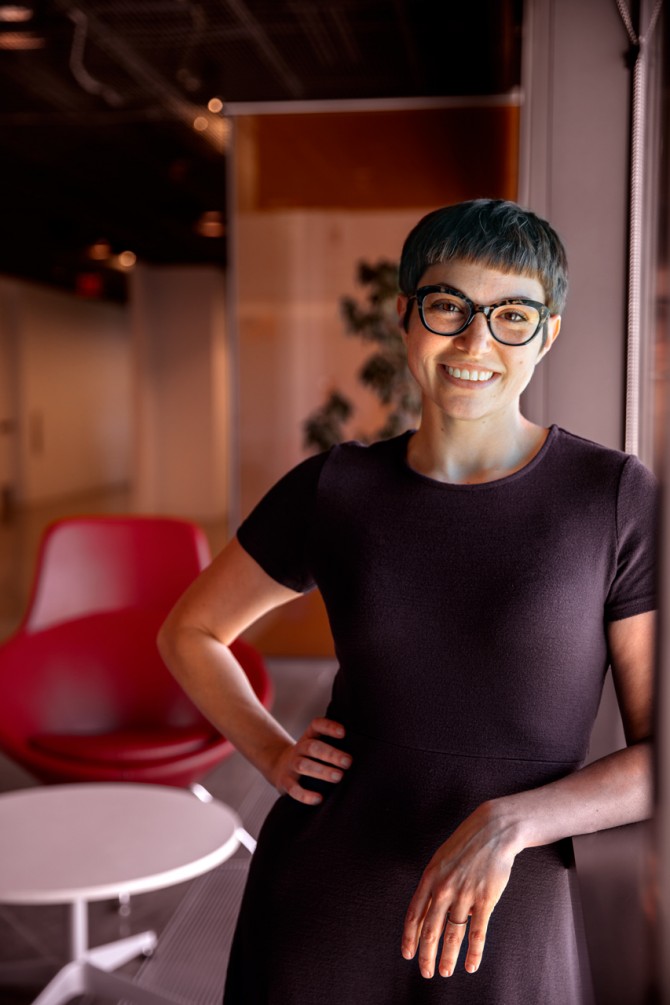Faculty profiles, fall 2018
Jawad Addoum: Exploring the effect of climate change on earnings
Global warming has been linked to everything from changes in fish populations to the rise in chronic health conditions such as asthma. Now Jawad Addoum, assistant professor of finance at the Dyson School of Applied Economics and Management, is collaborating on a project that is uncovering a new impact of climate change – the effect extreme temperatures have on company earnings.
Addoum began researching the effects of global warming on earnings when The Review of Financial Studies asked for research proposals in the emerging field of climate finance in 2017. Out of more than 100 submitted, only nine were accepted, including the project proposed by Addoum and two Dyson colleagues – David Ng, a professor of finance who studies how climate change affects financial market outcomes, and Ariel Ortiz-Bobea, an assistant professor who specializes in assessing the impacts of climactic extremes on economic activity.
Their research shows that out of 60 industries they examined in the United States, 40 percent exhibit sensitivity to extreme temperatures. For example, when summer temperatures rise above about 90 degrees F, profitability in the construction industry begins to taper. “There are winners and losers here,” Addoum says, “but we think that by understanding which industries are going to be helped or hurt by more intense and frequent temperature extremes, we can then take the next step and think about marketwide predictions for the future.”
The study on climate finance is the latest in a series of eclectic research projects that Addoum, the Robert R. Dyson Sesquicentennial Faculty Fellow, has undertaken in the area of behavioral finance. In a 2016 paper published in The Review of Financial Studies, Addoum and his co-author found that when the U.S. president’s party changes following an election, stock returns in industries that had been performing well begin to fare poorly – and industries that were not doing well start to prosper.
Addoum, who joined the faculty in 2016, says Cornell offers a unique opportunity to collaborate with researchers across a broad range of fields. “Interdisciplinary research is one of the exciting things in my work, and that’s what I’ve been able to take up at the Dyson School,” he says. “There are big synergies to the setup that we have here, and [Dyson] is really a microcosm of the vibrant interdisciplinary nature of Cornell.”
– Sherrie Negrea
Julia Chang: Confounding expectations
When students first walk into Julia Chang’s classes, they often do a double take. “I don’t think students are accustomed to having a Korean-American Spanish professor,” says Chang, assistant professor of Spanish in the College of Arts and Sciences’ Department of Romance Studies.
Her diverse research interests include gender and sexuality studies, medicine, and history and literature.
The 19th-century Spanish realist novels she’s analyzing for her first book, “Blood and Chastity: Narratives of Purity in Spanish Realism,” are massive – one weighs in at 1,500 pages – and they’re filled with concerns about bloodlines and sexual purity. In these novels, tainted blood lines, like marrying a seamstress or having a baby out of wedlock, can damn you forever in society. Chang is interested in realism’s fallen women, those caught in a bind between modern gender ideals and the persistence of blood-based social hierarchies.
Nineteenth-century Spain has surprising resonance for today, she says; for a new project, she’s exploring the roles that gender and disability played in Spanish colonialism and medicine. To the Spanish, soldiers were the highest expression of masculinity, because doctors verified the virility of conscripts as well as their physical beauty.
“Men who didn’t meet the requirements or who had to be discharged because they developed a disability were ‘useless,’” Chang says. “It sheds an interesting light on issues of gender and colonial history.”
Chang is part of a dual-career couple – her partner, Eli Friedman, teaches in the ILR School. “Cornell and ILR in particular went above and beyond to make it possible for me to be here; I’m very grateful,” she says.
As the child of immigrants, Chang understands what it feels like to be an outsider. She uses that empathy in her mentoring of first-generation and underprivileged students, an aspect of being a professor she loves. “They seek me out,” she explains. “The feeling of not fitting in helps me identify with them even if my story doesn’t match theirs.”
Chang also teaches as a core member of the Feminist, Gender and Sexuality Studies Program. Demand tripled the second time she taught the program's introductory course.
– Linda B. Glaser
Matt D’Amore: Leading a revolution in legal education
It’s been just a year since Matt D’Amore ’91 joined the Cornell Law faculty as the second full-time law professor on the Cornell Tech campus in New York City. There, he’s helping lead a revolution in legal education and now, as associate dean, helping lead the campus in its next phase of growth.
“I couldn’t imagine a more diverse and welcoming educational environment than Cornell Tech,” D’Amore says. “Where else could I work with academic leaders from law, business and tech, meet tech executives from places like Twitter and Etsy in the hallway or café, consult with startup founders at two resident incubators, all while teaching and mentoring a group of students focused on changing the world through technology? I learn something new from someone every day.”
The Law School’s two-year-old LL.M. degree program at Cornell Tech is aimed at developing a new type of lawyer with cutting-edge skills to succeed in the fast-moving tech world. D’Amore joined the Roosevelt Island campus in 2017 following a 20-year career focused on intellectual property, technology and life sciences at the international law firm Morrison & Foerster.
D’Amore and Cornell Tech are proving to be a perfect pairing. For starters, the tech lawyer-turned-professor is proof positive of the value of an interdisciplinary, experiential education, cornerstones of the Cornell Tech experience.
“Thirty years ago, my educational career started at Cornell in a cross-college program that was then hidden in the back of the Physical Sciences Library in Clark Hall that drew expertise from the Colleges of Arts and Sciences, Agriculture and Life Sciences, and Human Ecology,” he says. “Now I’m a part of Cornell’s next great interdisciplinary venture – it’s funny how things work out.”
Now the newest associate dean at Cornell Tech, D’Amore works with the campus’s professional programs in law and business. “I’m honored to help take the institution through its next chapter of development,” he says, “and I’m thrilled to be able to contribute to the growing Cornell and Cornell Tech community in New York City.”
– Christopher Brouwer
Karen Levy: At the intersection of technology and the law
Karen Levy was working as a law clerk for the U.S. federal court system when she decided to get her Ph.D. in sociology. “[For] a lot of the people you see in the justice system, it’s clear there are social roots to their problems,” she says. “There’s only so much you can do to help someone once they’re in court, but there’s more one can do when looking at how their lives have been shaped up to that point [by] the community they come from.”
Levy became interested in studying rules and how they are enforced, fairly or unfairly, by technology. Now an assistant professor of information science and adjunct assistant professor in the Cornell Law School, Levy researches how law and technology interact to regulate social life, with particular focus on social, organizational and ethical aspects of data collection.
“Much of what’s interesting and exciting about the development of new technology has to do with how we fit it into the way we live – what rules we make around technology, what consequences it might have for different groups of people, and how to make these choices ethically,” Levy says.
She is working on a book about surveillance in the workplace with an emphasis on the trucking industry and how technologies have been used in recent years to change how work is structured, how people are managed and how they intersect with cultural norms.
Levy is also working to develop a new initiative on artificial intelligence, policy and practice with several fellow information science professors and with a recent grant from the MacArthur Foundation.
“How do we make sure the benefits of technology accrue to the people who need them?” she asks. “One of the big levers to do that is the law – by setting appropriate policies to make sure we protect the most vulnerable people from being exploited by technology.
“I like putting myself in the spaces between technology and the law,” she says. “It’s really exciting to get to work on how these issues affect real people.”
– Leslie Morris
Media Contact
Get Cornell news delivered right to your inbox.
Subscribe



